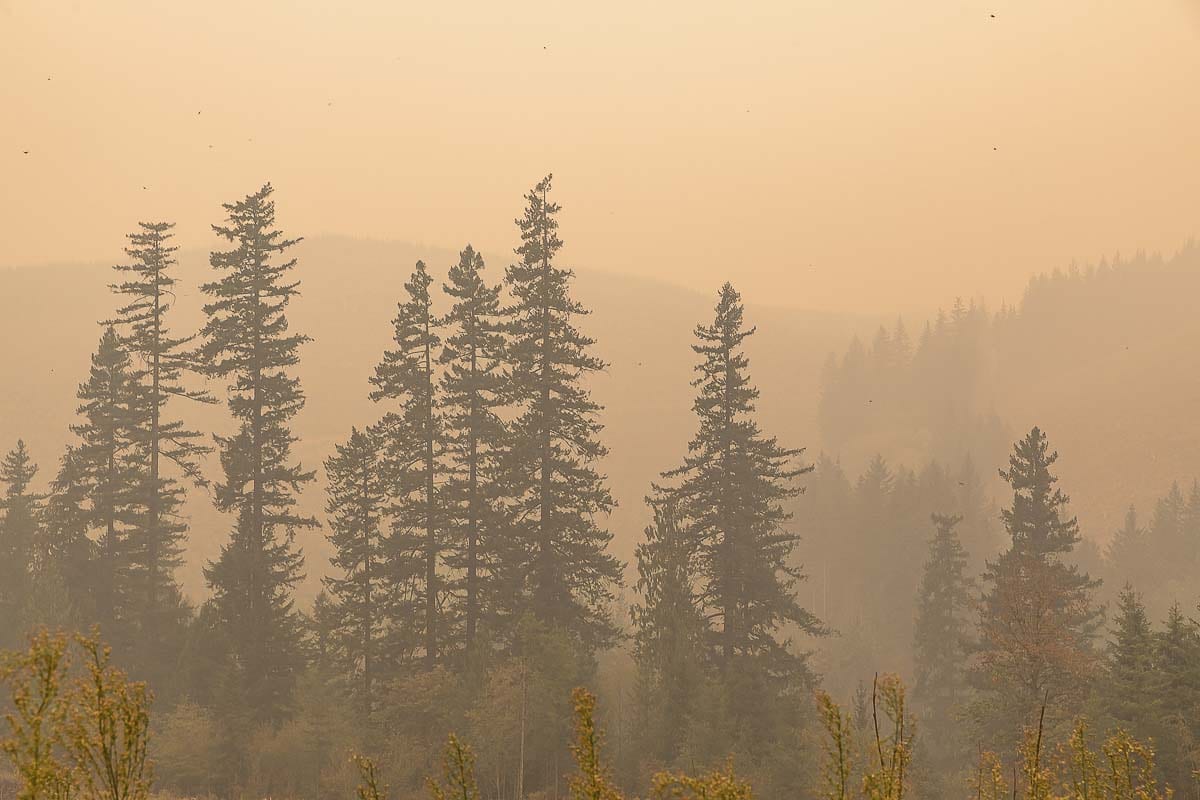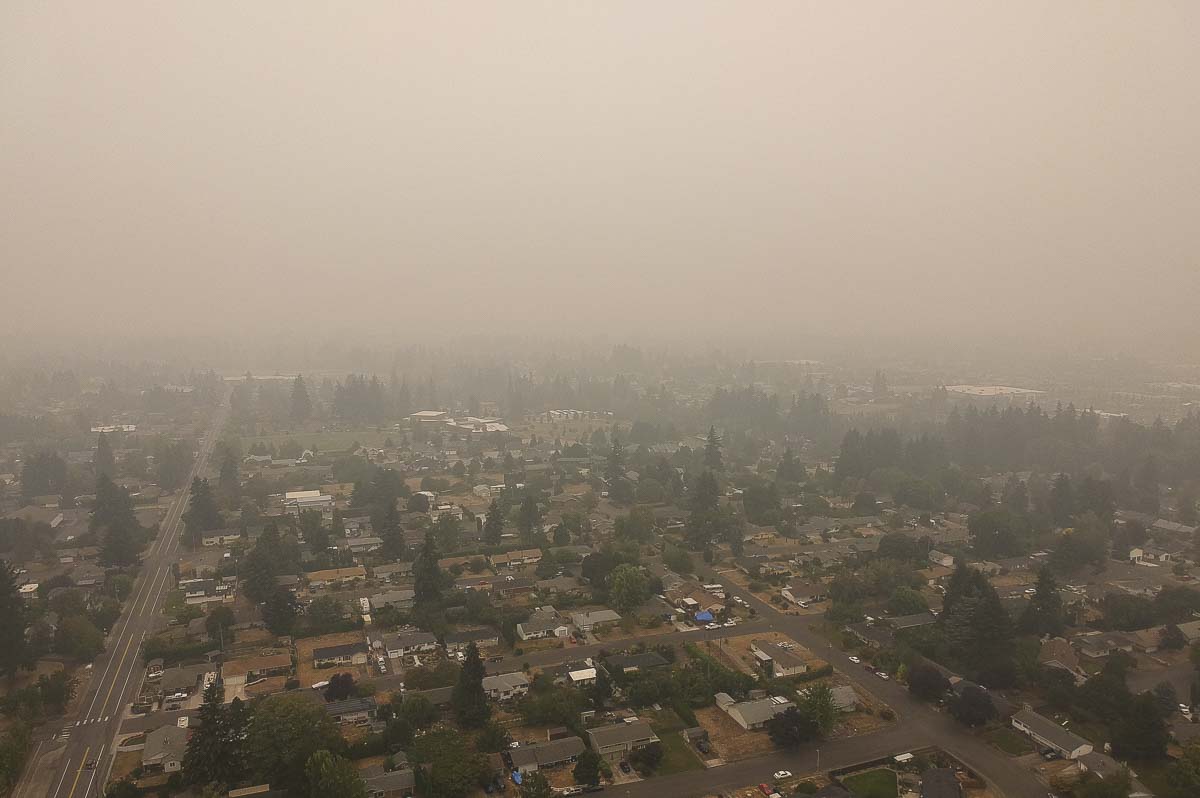Area fire Departments, police and community plan support strategies for the displaced
CLARK COUNTY — Lori and Randy McKinley’s house is still standing. As far as they know.
The couple resides outside the town of Molalla, OR where some of the worst wildfires in the region’s history, are still burning. Earlier this week, they evacuated here, to Clark County where their son’s family lives.
“We’re good, but hoping and believing that the house will be spared,” Lori said. “You hear the rumors. We got one last night that the house was gone. But then you have to think, ‘Okay, this is a rumor from somebody who heard from somebody who heard from somebody.’ Then you get on those satellite maps and hope that those are pretty up to date and accurate.”

Along with their daughter, son-in-law, grandson, and their daughter-in-law’s parents Mike and Becky Lehman, they are now staying with family in Hazel Dell, waiting for the call that they can come home. They are some of many evacuees from across the pacific northwest who are currently fleeing wildfires.
The city of Vancouver and it’s police department, along with area Fire Departments, like Fire District 3 and 6, are preparing to facilitate living spaces and care for the evacuees. The Clark County Fairgrounds and Event Center is a potential candidate for such an operation, as well as area churches. ilani Casino is also allowing people to use their parking lot.
Living Hope Church in Vancouver opened up their facilities today to anyone who has been displaced and does not have family nearby. The church will be screening people for any pandemic related illness and then allowing them to use the large building, restrooms and parking lot.
After some corrections, the Oregon state government now estimates more than 40,000 people have been evacuated, with tens of thousands more on standby.
Refugees here at home
Lori works as a teacher, and her husband Randy as manager at a transportation company. Their house sits in the country, outside Molalla. Not too long ago, Lori went to deliver some laptop computers to her students who needed them for remote learning.
When she arrived they were packing their cars.
“They said, ‘Well, we’re evacuating.’ That was kind of my first clue,” Lori said.
Then her next door neighbors started packing too.
“The point where it started feeling real, honestly, is when you’re two or three miles from home and you’re driving and you’re seeing the smoke all around and the glow all around,” Lori said. “It wasn’t just smoky, it was black. It’s not supposed to be black. It’s not that time of day, but it’s a black with the orangish glows around and it was surreal.”
Lori and Randy packed up and evacuated earlier this week. They coordinated ahead of time with their family, and headed for Vancouver. As they departed, long lines of traffic traced the roads and simply entering the highway required drivers to form an impromptu intersection.
Mike and Becky Lehman, who’s daughter is married to Lori and Randy’s son, also headed north this week to Clark County. Their house is in the center of town in Molalla. After making it safely to Vancouver, Mike had to return to grab more of their things.
“Tuesday the traffic was bad and the smoke was… suffocating is almost cliche, but that’s what it was,” Mike said. “I mean, even with masks on it was still difficult to breathe outside. I call it apocalyptic orange is the color, I describe it as. Really something you’d seen in a movie.”
The pacific northwest and much of the west coast of the U.S. has, quite literally, the worst air quality on the planet right now, surpassing even cities like Shanghai, according to air quality readings.
“When you’re driving through the blackness, you realize this is real,” Lori said. “We’re leaving home, will it be there when we come back?”
Both Mike and Lori expressed great appreciation and thankfulness for how their own community of Molalla and their family and new friends here in Clark County who have stepped up and come together around them.
“It’s amazing to watch my hometown galvanize and become a force that if the fire comes, we’ll say, ‘Come on, let’s see what you got,’” Mike said, of Molalla. “There’s no doubt in my mind that if they would let us, every person would be standing on the front line with those firefighters from town.”
If towns to the north of Clark County near the Big Hollow fire, such as Chelatchie and Cougar, move up in the evacuation notice levels, those evacuees are expected to come to the area as well.
Loving their neighbors
In order to help evacuees, like those from Molalla, strategies are being set up to assist those who do not have family to stay with.
“The top one in my mind would be like the Clark County Event Center, someplace big that you can house people and there’s plenty of parking,” said Sgt. Therese Kubala with the Vancouver Police Department.
The folks at Living Hope Church in Vancouver are offering their site right away, which is located off Andresen in the east part of the city. Much like their program for getting the homeless shelter, food and showers in the winter, the church will set up a similar space for evacuees.

The space will be open from Sept. 11 at 7:30 p.m. through the afternoon of Monday, Sept. 14; at which point the situation will be reevaluated. In order to connect with the church, those in need can simply show up, or call ahead and go through the COVID-19 screening questions.
“The heart behind it was that we don’t want to see anybody out there in the smoke from the fires,” said Daisy Delmore, a pastor at Living Hope. “Our heart is to help people that are maybe displaced out of their homes for the first time and never experienced something like this. We want to be able to encourage them, let them know that they have family here in the community.”
In addition, Living Hope is currently accepting donations to help those in need. Many in the community have taken to social media to offer not only donations, but also their own homes as places for those fleeing the fires to stay.
Firefighting and beyond
On the local fire fighting front, Fire Districts 3 and 6 had a busy week that began with dozens of small vegetation fires within Clark County, with the largest in east county. District 3 had more than 50 responses on Monday alone, after staffing up with an extra 20 firefighters in preparation for the high, dry wind conditions.
Now, they are on standby to potentially assist in the areas they are trained for.
At District 3, Fire Chief Scott Sorenson and his crews are prepared and certified to have some members deployed to the north to help with efforts on the Big Hollow fire, if needed. The district currently has a handful of firefighters deployed in Cold Springs, and one as far as California.
“We’ve been talking about the Big Hollow fire and preparing to provide resources to that if it were to come down into northern Clark County,” Sorenson said. “The real work happens years before the event. So preparing your home is important, and we talk about that all the time. Then when the weather does change, like it is now, we can really go to work and and go after it.”

In a live stream Friday, the National Forest Service explained that moisture and cooler temperatures could be coming to the Big Hollow area next week, as well as continued lower winds.
Fire Chief Kristin Maurer and her crews at Fire District 6, are mainly classified for urban areas, and can handle small brush fires like those seen earlier this week along Fruit Valley Road. They will not, however, be deploying to assist with the larger fires up north, she said. Rather, they will assist District 3 by covering their ground here at home, if and when District 3 deploys firefighters to the national forest.
“We could send people to help their department and cover Hockinson while they went and did those fires,” Maurer said. “On our webpage, we have exactly what people need to prepare for, for a wildfire. So when you hear Oregon talking about the level one, two and three evacuations, it outlines in there for our community exactly what that means.”
In terms of aiding in the evacuation process, both fire districts will assist with whatever the situation might require, from medical to transportation. Clark County Emergency Management, as well as law enforcement, would facilitate locations and coordinated responses, Maurer explained.
“We’ve taken a lot of calls about, is it safe to come here? Are they going to have to evacuate here? And the answer to that currently is no,” Sorenson said. “But of course, we’re dealing with smoke problems, but I think most of the west side of Oregon and Washington are dealing with that now.”
Both Sorenson and Maurer encouraged residents to remember that a total burn ban is in effect, and to protect houses and property from fires by trimming and pruning trees and bushes. Residents in District 3 can request an inspection and receive recommendations on how to make their property safer.
Both chiefs, as well as firefighters working with the National Forest Service, also encouraged the community to remember how much more difficult the situation is for their brothers and sisters in Oregon, California and northeastern Washington. Donations are appreciated, but would be best suited for the Wildland Firefighters Foundation, they said.
“Our thoughts are with our neighboring counties who have been hit so hard by this,” Sorrenson said.
“We’ve been fortunate that we haven’t been affected from [the fires] the way that other states or other areas have,” Maurer said. “I’m just thinking of the Oregon firefighters right now that are trying to put a stop to those fires merging. I think if you are in Clark County, and you can take family in from Oregon, that’s great, and if you can help out in any way, that’s great.”




